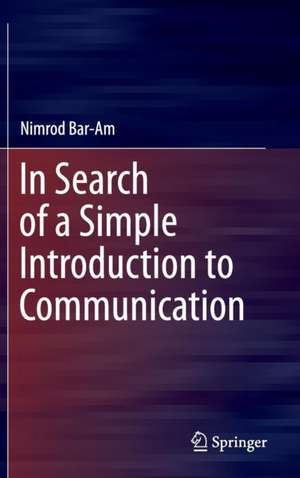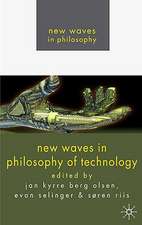In Search of a Simple Introduction to Communication
Autor Nimrod Bar-Amen Limba Engleză Hardback – 18 feb 2016
Communication schools promise their students an understanding of the source of a principal and dynamical power in their lives, a power shaping societies and identities, molding aspirations, and deciding their fates. They also promise students a practical benefit, a chance to learn the secret of controlling that dynamical power, improving a set of skills that would ensure thema critical edge in the future job market: become better media experts for all media. Yet no one seems to know how such promises are met. Can there be a general theory of communication? If not, what can (should) communication students learn? This book looks at the problem from a philosophical perspective and proposes a framework wherein critical cases can be tested.
| Toate formatele și edițiile | Preț | Express |
|---|---|---|
| Paperback (1) | 384.31 lei 6-8 săpt. | |
| Springer International Publishing – 30 mar 2018 | 384.31 lei 6-8 săpt. | |
| Hardback (1) | 391.61 lei 6-8 săpt. | |
| Springer International Publishing – 18 feb 2016 | 391.61 lei 6-8 săpt. |
Preț: 391.61 lei
Nou
Puncte Express: 587
Preț estimativ în valută:
74.93€ • 78.24$ • 62.02£
74.93€ • 78.24$ • 62.02£
Carte tipărită la comandă
Livrare economică 04-18 aprilie
Preluare comenzi: 021 569.72.76
Specificații
ISBN-13: 9783319256238
ISBN-10: 3319256238
Pagini: 216
Ilustrații: X, 216 p.
Dimensiuni: 155 x 235 x 18 mm
Greutate: 0.5 kg
Ediția:1st ed. 2016
Editura: Springer International Publishing
Colecția Springer
Locul publicării:Cham, Switzerland
ISBN-10: 3319256238
Pagini: 216
Ilustrații: X, 216 p.
Dimensiuni: 155 x 235 x 18 mm
Greutate: 0.5 kg
Ediția:1st ed. 2016
Editura: Springer International Publishing
Colecția Springer
Locul publicării:Cham, Switzerland
Cuprins
Part I: Getting Acquainted.- Chapter 1 Who Am I? Where Do I Come From? Where Am I Headed?.-Chapter 2 Who Are You? Why Are You Here? Can I Help You Achieve Your Goals?.- Chapter 3 Appendix from the Classroom: Toward a Useful Introduction to Communication.- Chapter 4 On Questions of the Form “What is X?”, and on the Seemingly Innocent Question “What is Communication?” in Particular.- Part II: Toward a Philosophy of Communication.- Chapter 5 Emergence and Reduction.- Chapter 6 The Fundamental Problem of the Study of Communication.- Chapter 7 Is There Communication in the Reduced World?.- Chapter 8 The Unbelievable Complexity of the Truly Simple.- Chapter 9 Information in Context.- Chapter 10 The Reductionist Point of View – Extensionalism.- Chapter 11 A Note on the Intelligence of Computers.- Chapter 12 Revisiting Context and Meaning: Claude Shannon’s Mathematical Theory of Communication.- Chapter 13 On Errors, On Correcting Them, and Thus On Goals (With and Without Scare Quotes): Cybernetics and Reductionism.- Chapter 14 Back to the Basic Problem of Communication: The Limitations of Cybernetics.- Chapter 15 Toward a Philosophy of Communication.- Part III: Toward the Simple Introduction to Communication.- Chapter 16 The Simple Introduction to Communication: A Methodological Preface.- Chapter 17 Example #1: The Classroom.- Chapter 18 Example #2: Stigmergy and Autonomy in the Cyber-age.
Recenzii
“Any author who manages to write a penetrating, thoughtful, and evocative book on an underappreciated topic deserves applause. Nimrod Bar-Am does this and much more. … Bar-Am does us all good service, and his passion for his subject makes the reading not only intellectually gratifying but also sown with moments of pure joy. … will find an abundance of riches which provoke, capture, instruct, at times even elevate, and always lure to reflection.” (Itay Shani, Philosophy of the Social Sciences, November, 2016)
Notă biografică
Nimrod Bar-Am is a philosopher of Science, Methodology and Communication. He is a Senior lecturer and head of the Rhetoric and Philosophy of Communication unit at the Communication Department of Sapir College, Israel.
He is the author of Extensionalism the Revolution in Logic (Springer 2008) and of various articles and peer-reviewed publications, most recent of which is “Systems Heuristics and Digital Culture” with Raphael Sassower, in: Traditions of Systems Theory: Major Figures and Developments (Routledge 2013). His research focuses on Philosophy of Communication and on Scientific Methodology.
He is the author of Extensionalism the Revolution in Logic (Springer 2008) and of various articles and peer-reviewed publications, most recent of which is “Systems Heuristics and Digital Culture” with Raphael Sassower, in: Traditions of Systems Theory: Major Figures and Developments (Routledge 2013). His research focuses on Philosophy of Communication and on Scientific Methodology.
Textul de pe ultima copertă
This book is a philosophical introduction to the field of communication and media studies. In search of the philosophical backgrounds of that relatively young field, the book explores why this overwhelmingly popular discipline is in crisis. The book discusses classic introductions on communication, provides an update on lessons learned, and re-evaluates the work of pioneers in the light of up-to-date philosophical standards. It summarizes various debates surrounding the foundations of system theory and especially its applicability to the Social Sciences in general and to Communication Studies in particular.
Communication schools promise their students an understanding of the source of a principal and dynamical power in their lives, a power shaping societies and identities, molding aspirations, and deciding their fates. They also promise students a practical benefit, a chance to learn the secret of controlling that dynamical power, improving a set of skills that would ensure thema critical edge in the future job market: become better media experts for all media. Yet no one seems to know how such promises are met. Can there be a general theory of communication? If not, what can (should) communication students learn? This book looks at the problem from a philosophical perspective and proposes a framework wherein critical cases can be tested.
Communication schools promise their students an understanding of the source of a principal and dynamical power in their lives, a power shaping societies and identities, molding aspirations, and deciding their fates. They also promise students a practical benefit, a chance to learn the secret of controlling that dynamical power, improving a set of skills that would ensure thema critical edge in the future job market: become better media experts for all media. Yet no one seems to know how such promises are met. Can there be a general theory of communication? If not, what can (should) communication students learn? This book looks at the problem from a philosophical perspective and proposes a framework wherein critical cases can be tested.
Caracteristici
Offers an up-to-date study of the theoretical challenges facing Communication studies Discusses the extent to which the challenges can be met Focuses on the fruitful problems of Orientation and Communication in a constructive way Includes supplementary material: sn.pub/extras














